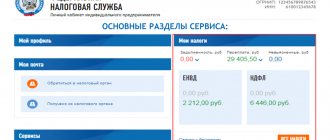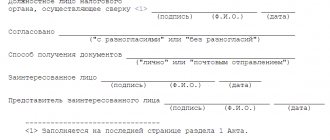In what cases can an account be blocked?
Tax authorities block accounts in order to force debtors to pay taxes and insurance premiums - this is stated in paragraph 1 of Art.
72 of the Tax Code of the Russian Federation (literally: “in order to ensure the fulfillment of the obligation” to pay mandatory payments). The procedure is called “suspension of operations on bank accounts.” The right of the Federal Tax Service (FTS) and its territorial bodies to suspend transactions on the current accounts of companies and entrepreneurs is enshrined in sub-clause. 5 p. 1 art. 31 Tax Code of the Russian Federation.
Specific reasons for blocking are described in detail in Art. 76 Tax Code of the Russian Federation. Tax authorities have this right if:
- The taxpayer - a business entity has an unpaid debt for taxes, fees, mandatory contributions to the insurance fund, penalties (fines and fines), and the tax authorities' demand for payment of the debt is not fulfilled.
- The organization or individual entrepreneur did not submit a declaration or calculation of the amounts of personal income tax or insurance contributions to the tax office within 20 working days (until 07/01/2021 - 10 days) after the expiration of the deadline for fulfilling such an obligation.
- A legal entity obliged to submit reports electronically (the list of such persons is given in clause 5.1 of Article 23 of the Tax Code) did not fulfill the obligation to receive documents in electronic form from the Federal Tax Service or did not submit to the authority a receipt of receipt of the request within 10 days after the expiration the deadline established by the Tax Code of the Russian Federation (subclauses 1.1, 2, 3, clause 3, Article 76 of the Tax Code of the Russian Federation).
If one of the listed circumstances is present, the head of the Federal Tax Service or his deputy makes a decision to suspend operations in the form established by Appendix 14 to the Federal Tax Service order No. ED-7-8/ [email protected] “On approval of document forms...”.
On the day the decision is made or the next day, it is sent electronically to the bank, and a copy is sent to the taxpayer. From the moment the document is received, the bank is obliged to unconditionally suspend operations and report this to the tax authority.
From July 1, 2022, tax authorities have the right to notify the taxpayer about the upcoming blocking of an account for failure to submit reports - no later than within 14 business days before the corresponding decision is made. Please note that this is the right, not the obligation of the inspectorate, so they may not report it.
ConsultantPlus experts explained how to unblock a current account if the Federal Tax Service has made a decision to suspend operations. If you don't already have access, get a free trial of online legal access.
How to remove a seizure from a current account
If you cannot wait until the account seizure is cancelled, you can speed up the process:
- When paying arrears, penalties, fines, interest, payment documents or copies thereof must be submitted to the tax service along with an application to remove the seizure from the account (Clause 8 of Article 76 of the Tax Code of the Russian Federation).
- Submitting a declaration, calculation of 6-NDFL or DAM will also allow you to remove the seizure from the account (paragraph 2, paragraph 3, paragraph 2, paragraph 3.2, article 76 of the Tax Code of the Russian Federation). At the same time, you must submit an application to remove the arrest from the account.
- If the amount of funds in the bank account exceeds the amount of seized funds, then to resume operations on the account it is necessary to draw up a free-form application (clause 9 of Article 76 of the Tax Code of the Russian Federation). In this case, the arrest can only be lifted from the account specified in the operative part of the decision to lift the suspension of operations. At the same time, the remaining blocked accounts will remain unchanged (letter of the Ministry of Finance of Russia dated January 16, 2013 No. 03-02-07/1-10).
- Submission of a receipt for the receipt of documents, documents and explanations requested by the tax authority, or the appearance of the taxpayer himself with the appropriate application will allow the arrest to be lifted from the account (subclause 2, clause 3.1, article 76 of the Tax Code of the Russian Federation).
There are other grounds for lifting the arrest, regulated by federal laws. The arrest from the account is removed automatically if the company is at the stage of liquidation, bankruptcy proceedings or declared bankrupt. At the same time, the inspection does not make an appropriate decision (letters of the Ministry of Finance of Russia dated September 16, 2013 No. 03-02-08/38179, dated November 16, 2010 No. 03-02-07/1-534 (clause 1), resolution of the 9th Arbitration Appeal court dated 06.06.2011 No. 09AP-11202/2011-AK).
Whether payments are possible under a court decision if the account is blocked for failure to file a declaration, find out by following the link.
Deadlines for unblocking in case of tax arrears and its repayment
In accordance with paragraph 8 of Art. 76 of the Tax Code no later than the next day after receiving information about the collection of tax arrears, the head or deputy head of the Federal Tax Service Inspectorate makes a decision to cancel the suspension of transactions on the account. After this, it must be sent to the bank in the manner established by Bank of Russia Regulation No. 440-P dated November 6, 2014.
The communication schedule (appendix to regulation 440-P) determines the date and time the credit institution receives a decision from the fiscal department. In all cases, the decision is executed immediately after verification if it is received from 9:00 to 16:00 (on Friday - before 15:00).
Thus, the period for unblocking an account after paying taxes or other mandatory payments and penalties should not exceed three working days. In this case, the period is calculated from the day when the Federal Tax Service received information from the bank or from the taxpayer.
Base 2.
According to paragraph 3 of Art. 76 of the Tax Code of the Russian Federation, a decision to suspend transactions on bank accounts and electronic money transfers can also be made if the taxpayer fails to submit a tax return to the tax authority within 10 days after the expiration of the established deadline for its submission.
On January 1, 2015, a new version of clause 3 of Art. will come into force. 76 of the Tax Code of the Russian Federation, adopted by Art. 10 of Federal Law No. 134-FZ of June 28, 2013 “On Amendments to Certain Legislative Acts of the Russian Federation in Combating Illegal Financial Transactions” (as amended on July 21, 2014) (hereinafter referred to as Law No. 134-FZ) , which will clarify that a decision to suspend transactions on bank accounts and electronic money transfers can be made within three years. This period is calculated from the expiration of 10 days following the end of the established deadline for submitting the declaration.
When the arrest is lifted after submitting the required reports
The deadline for unblocking the account after submitting reports, on the basis of clause. 1 clause 3.1 art. 76 of the Tax Code of the Russian Federation is determined by the time the tax authority made a decision to lift the suspension of operations on the account. In this case, the starting point in the calculation is the submission by the taxpayer of a declaration to the tax office.
After fulfilling the obligation to submit reports, the Federal Tax Service Inspectorate, no later than the next working day, makes a decision to cancel the arrest and sends it to the bank. The bank, in turn, executes the decision within one day.
Consequently, the period for removing the seizure from the account will be no more than three working days.
Cancellation of account seizure
The seizure of the account can be canceled after its cause is eliminated (paragraph 2, paragraph 3, paragraph 8, article 76 of the Tax Code of the Russian Federation). If the arrest was imposed in order to provide funds for collecting arrears, then after payment of arrears of taxes, penalties, fines and interest, the arrest of the account will be lifted by decision of the tax authorities.
If the arrest is related to failure to submit a tax return or calculation of 6-NDFL, RSV, then the withdrawal will occur after the documents are submitted to the tax service. The same applies to missing the deadline for submitting a receipt for acceptance of documents.
It will take some time to lift the arrest by decision of the tax authorities, the period depends on the basis for the arrest. In this case, the inspection is responsible for violating the deadlines for removing the arrest from the account in the form of interest (clause 9.2 of Article 76 of the Tax Code of the Russian Federation). The decision to cancel has a prescribed form, approved by order of the Federal Tax Service of Russia dated August 14, 2020 No. ED-7-8/ [email protected]
Deadline for lifting the block if the cause was violations of electronic document flow with the Federal Tax Service
Unblocking an account when eliminating violations related to the electronic circulation of documents between the taxpayer and the Federal Tax Service is carried out in the same order:
- Elimination of the violation that served as the basis for the suspension of expense transactions.
- No later than the next day - the tax authority makes a decision on cancellation.
- Sending the decision to the credit institution on the same or subsequent business day.
- Removal of blocking by the bank.
Unblocking period is from one to three working days. In this case, the beginning of its calculation is the day of submission to the tax receipt of receipt of documents or the date of submission of documents requested by the inspectorate.
ATTENTION! If the tax authorities are late in unblocking the current account, the company may demand interest. They are calculated at the refinancing rate of the Central Bank of the Russian Federation.
Base 3.
In accordance with paragraphs. 2 clause 10 art. 101 of the Tax Code of the Russian Federation, the suspension of transactions on bank accounts can be an interim measure applied by the tax authority after a decision is made to hold the taxpayer accountable for committing a tax offense. This measure is aimed at ensuring the possibility of execution of this decision.
In this case, the decision to suspend transactions on bank accounts and electronic money transfers comes into force from the day it is made and is valid until the day the decision to hold the taxpayer accountable for committing a tax offense is executed or until the day the decision is canceled by a higher tax authority or court .
It should be noted that the suspension of transactions on bank accounts in order to take interim measures can only be applied after the imposition of a ban on the alienation (pledge) of the taxpayer’s property and if the total value of such property according to accounting data is less than the total amount of arrears, penalties and fines to be paid.
Results
Thus, the period for lifting the blocking of a current tax account is no more than three working days, which are counted from the moment the reason for the blocking is eliminated. No later than the next day, the head of the Federal Tax Service or his deputy makes a decision to cancel the arrest. On the same day or the next day it is sent to the bank, which removes the restrictions.
Sources:
- Tax Code of the Russian Federation
- Regulations of the Bank of Russia “On the procedure for sending certain documents of tax authorities to the bank, as well as sending by the bank to the tax authority of certain documents of the bank in electronic form in cases provided for by the legislation of the Russian Federation on taxes and fees” dated November 6, 2014 No. 440-P
You can find more complete information on the topic in ConsultantPlus. Free trial access to the system for 2 days.
What can you pay for from a blocked account?
You cannot make debit transactions on an account that is blocked. For example, you cannot make transfers to counterparties from it. However, this does not mean that all movement on the account stops. If only part of the funds in the account is blocked (this is possible if the blocking occurred due to non-payment of taxes, penalties, fines, insurance premiums), then the organization can carry out any expense transactions regarding the “balance”.
But even in the event of a complete blocking of an account (for example, due to failure to submit a declaration), the company still has the opportunity to make, although not all, but some types of transfers. The fact is that paragraph 3 of paragraph 1 of Article 76 of the Tax Code of the Russian Federation gives the right to exercise:
- payments, the priority of execution of which in accordance with civil legislation (clause 2 of Article 855 of the Civil Code of the Russian Federation) precedes the fulfillment of the obligation to pay taxes, fees, insurance premiums (these are 1st, 2nd and 3rd priority);
- operations for writing off funds to pay taxes (advance payments), fees, insurance premiums, relevant penalties and fines and transferring them to the budget system.
Please note that, according to officials, the “freezing” of the account does not apply to the transfer of contributions “for injuries” that go to the Federal Social Insurance Fund of Russia (letter of the Ministry of Finance of Russia dated February 20, 2012 No. 03-02-07/1-41).
Thus, blocking the account will not prevent the company from paying timely, for example, current taxes (letter of the Ministry of Finance of Russia dated February 15, 2017 No. 03-02-07/1/8454), as well as paying its employees for wages, payments for which relate to third stage (letter of the Ministry of Finance of Russia dated 03/05/2014 No. 03-02-07/1/9536).
What to do if the bank has suspended operations on the account: step-by-step instructions
I will now describe the real situation in a small town of about 20,000 people (with adjacent villages). I want to say that sooner or later, first medium-sized and then large cities will adapt to this situation - as a result of the final and irrevocable victory of Rosfinmonitoring. I propose to refute... So. A small town, since Soviet times there have been 5 “families” in it, which hold this city in all branches of government, smoothly transferring certain posts to each other, relatives, sons, daughters... now down to the grandchildren of “those very strong managers and business executives” from the 70s, things are coming slowly. Sometimes someone is sent from the region, sometimes, on the contrary, they take him to the region with a promotion, but in general everyone is their own, everyone agrees, if anything happens.
There are several facilities in the town - a railway station, a restaurant and a cafe, 3 grocery stores, several mini-24-hour shops, a market (naturally), a department store, also Sberbank, and a post office. There is a hospital. There is a small plant nearby, but in principle there is no work in the city. Working in public utilities or on the railroad is considered cool - because... they pay a lot of money for it (by town standards). Needless to say, all private business objects belong to one of the members of the 5 families.
If you want to sell something from fruits, vegetables, from your farm (meat, for example) = buy a place on the market, pay the “associated” fees, and stand all day, sell, according to the rules for collective farm markets. There are “permanent” stalls at the market - where they sell shoes, children's toys, clothes, whatever. Naturally, without cash registers, of course only for cash.
Opening your own business in this city makes no sense. If you want to open a small room where, say, you sell chargers/cables for phones, you will compete with the same department that rents space in one of the stores, and was started as a “home” business for someone young from a family, so that “the boy learns to work.” You can become a salesperson - you can’t start your own business - or go to a regional center nearby - but people go there from all the surrounding towns and villages, and the situation there is very similar (although the city is already 100,000 people strong).
Needless to say, the indicated objects - restaurants, cafes, grocery stores, mini-magazines, manufactured goods - will NEVER be on the “black” list of Rosfinmonitoring, and will always continue to operate, being closed for re-registration - perhaps only after some kind of regional inspection (which, by the way, happens from time to time, but does not interfere with further work).
There are no “chains” in this town, but if they appear, they will, of course, crush local specialized businesses... although it may be possible (or we will have to come to an agreement) so that the _right_ person buys the franchise and continues to earn money for himself, and for the family, and for the network .






